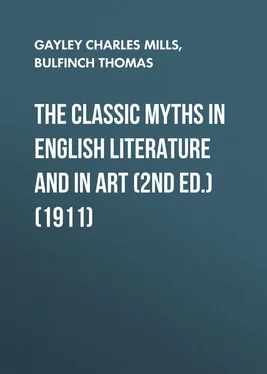Thomas Bulfinch - The Classic Myths in English Literature and in Art (2nd ed.) (1911)
Здесь есть возможность читать онлайн «Thomas Bulfinch - The Classic Myths in English Literature and in Art (2nd ed.) (1911)» — ознакомительный отрывок электронной книги совершенно бесплатно, а после прочтения отрывка купить полную версию. В некоторых случаях можно слушать аудио, скачать через торрент в формате fb2 и присутствует краткое содержание. Жанр: foreign_antique, foreign_prose, на английском языке. Описание произведения, (предисловие) а так же отзывы посетителей доступны на портале библиотеки ЛибКат.
- Название:The Classic Myths in English Literature and in Art (2nd ed.) (1911)
- Автор:
- Жанр:
- Год:неизвестен
- ISBN:нет данных
- Рейтинг книги:4 / 5. Голосов: 1
-
Избранное:Добавить в избранное
- Отзывы:
-
Ваша оценка:
- 80
- 1
- 2
- 3
- 4
- 5
The Classic Myths in English Literature and in Art (2nd ed.) (1911): краткое содержание, описание и аннотация
Предлагаем к чтению аннотацию, описание, краткое содержание или предисловие (зависит от того, что написал сам автор книги «The Classic Myths in English Literature and in Art (2nd ed.) (1911)»). Если вы не нашли необходимую информацию о книге — напишите в комментариях, мы постараемся отыскать её.
The Classic Myths in English Literature and in Art (2nd ed.) (1911) — читать онлайн ознакомительный отрывок
Ниже представлен текст книги, разбитый по страницам. Система сохранения места последней прочитанной страницы, позволяет с удобством читать онлайн бесплатно книгу «The Classic Myths in English Literature and in Art (2nd ed.) (1911)», без необходимости каждый раз заново искать на чём Вы остановились. Поставьте закладку, и сможете в любой момент перейти на страницу, на которой закончили чтение.
Интервал:
Закладка:
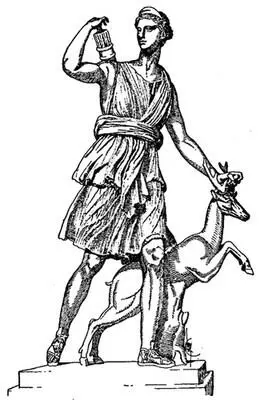
Fig. 18. Diana (Artemis) of Versailles
Diana was mistress of the brute creation, protectress of youth, patron of temperance in all things, guardian of civil right. The cypress tree was sacred to her; and her favorites were the bear, the boar, the dog, the goat, and specially the hind.
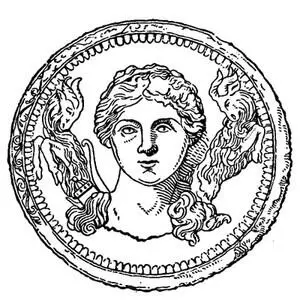
Fig. 19. Artemis
33. Jonson's Hymn to Cynthia (Diana).
Queen and Huntress, chaste and fair,
Now the sun is laid to sleep,
Seated in thy silver chair
State in wonted manner keep:
Hesperus entreats thy light,
Goddess excellently bright.
Earth, let not thy envious shade
Dare itself to interpose;
Cynthia's shining orb was made
Heaven to clear when day did close:
Bless us then with wishèd sight,
Goddess excellently bright.
Lay thy bow of pearl apart,
And thy crystal-shining quiver;
Give unto the flying hart
Space to breathe, how short soever:
Thou that mak'st a day of night,
Goddess excellently bright. 31 31 From Cynthia's Revels.
34. Venus (Aphrodite), goddess of love and beauty, was, according to the more ancient Greek conception, a daughter of Jupiter and Dione; 32 32 Iliad, 5, 370, etc.
but Hesiod says that she arose from the foam of the sea at the time of the wounding of Uranus, and therefore was called, by the Greeks, Aphrodite, the foam-born . 33 33 A popular etymology.
Wafted by the west wind, and borne upon the surge, she won first the island of Cythera; thence, like a dream, she passed to Cyprus, where the grace and blossom of her beauty conquered every heart. Everywhere, at the touch of her feet the herbage quivered into flower. The Hours and Graces surrounded her, twining odorous garlands and weaving robes for her that reflected the hues and breathed the perfume of crocus and hyacinth, violet, rose, lily, and narcissus. To her influence is ascribed the fruitfulness of the animal and of the vegetable creation. She is goddess of gardens and flowers, of the rose, the myrtle, and the linden. The heaths and slumberous vales, pleasant with spring and vernal breezes, are hers. In her broidered girdle lurk "love and desire, and loving converse that steals the wits even of the wise." For she is the mistress of feminine charm and beauty, the golden, sweetly smiling Aphrodite, who rules the hearts of men. She lends to mortals seductive form and fascination. To a few, indeed, her favor is a blessing; but to many her gifts are treacherous, destructive of peace. Her various influence is exemplified in the stories of Pygmalion and Adonis, Paris and Æneas, Helen, Ariadne, Psyche, Procris, Pasiphaë, and Phædra. Her power extended over sea as well as land, and her temples rose from many a shore. On the waters swan and dolphin were beloved of her; in air, the sparrow and the dove. She was usually attended by her winged son Cupid, of whom much is to be told. Especially dear to her were Cyprus, Cnidos, Paphos, Cythera, Abydos, Mount Eryx, and the city of Corinth.
35. The "Venus of Milo."Of artistic conceptions of Aphrodite, the most famous are the statues called the Venus of Melos and the Venus of the Medici. 34 34 For Venus in poetry and art, see Commentary.
A comparison of the two conceptions is instituted in the following poem. 35 35 From the Venus of Milo, by E. R. Sill, formerly professor of English Literature in the University of California.
The worshiper apostrophizes the Venus of Melos, that "inner beauty of the world," whose tranquil smile he finds more fair than "The Medicean's sly and servile grace":
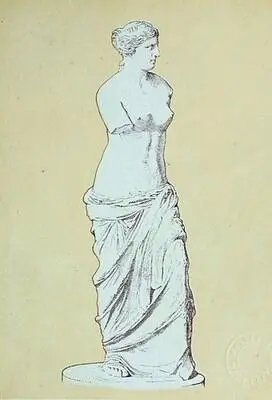
VENUS OF MELOS
From our low world no gods have taken wing;
Even now upon our hills the twain are wandering: 36 36 The references are to the Berkeley Hills, the Bay of San Francisco, and the glimpses of the Pacific.
The Medicean's sly and servile grace,
And the immortal beauty of thy face.
One is the spirit of all short-lived love
And outward, earthly loveliness:
The tremulous rosy morn is her mouth's smile,
The sky, her laughing azure eyes above;
And, waiting for caress.
Lie bare the soft hill-slopes, the while
Her thrilling voice is heard
In song of wind and wave, and every flitting bird.
Not plainly, never quite herself she shows:
Just a swift glance of her illumined smile
Along the landscape goes;
Just a soft hint of singing, to beguile
A man from all his toil;
Some vanished gleam of beckoning arm, to spoil
A morning's task with longing, wild and vain.
Then if across the parching plain
He seek her, she with passion burns
His heart to fever, and he hears
The west wind's mocking laughter when he turns,
Shivering in mist of ocean's sullen tears.
It is the Medicean: well I know
The arts her ancient subtlety will show, —
The stubble field she turns to ruddy gold;
The empty distance she will fold
In purple gauze; the warm glow she has kissed
Along the chilling mist:
Cheating and cheated love that grows to hate
And ever deeper loathing, soon or late.
Thou, too, O fairer spirit, walkest here
Upon the lifted hills:
Wherever that still thought within the breast
The inner beauty of the world hath moved;
In starlight that the dome of evening fills;
On endless waters rounding to the west:
For them who thro' that beauty's veil have loved
The soul of all things beautiful the best.
For lying broad awake, long ere the dawn,
Staring against the dark, the blank of space
Opens immeasurably, and thy face
Wavers and glimmers there and is withdrawn.
And many days, when all one's work is vain,
And life goes stretching on, a waste gray plain,
With even the short mirage of morning gone,
No cool breath anywhere, no shadow nigh
Where a weary man might lay him down and die,
Lo! thou art there before me suddenly,
With shade as if a summer cloud did pass,
And spray of fountains whispering to the grass.
Oh, save me from the haste and noise and heat
That spoil life's music sweet:
And from that lesser Aphrodite there —
Even now she stands
Close as I turn, and O my soul, how fair!
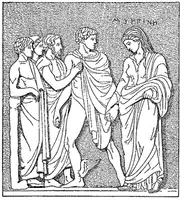
Fig. 20. Hermes Psychopompos
36. Mercury (Hermes), born in a cave of Mount Cyllene in Arcadia, was the son of Jupiter and Maia (the daughter of Atlas). According to conjecture, his name Hermes means the Hastener . Mercury, swift as the wind, was the servant and herald of Jupiter and the other gods. On his ankles (in plastic art), and his low-crowned, broad-brimmed petasus , or hat, were wings. As messenger of Heaven, he bore a wand ( caduceus ) of wood or of gold, twined with snakes and surmounted by wings, and possessed of magical powers over sleeping, waking, and dreams. He was beautiful and ever in the prime of youthful vigor. To a voice sweet-toned and powerful, he added the persuasiveness of eloquence. But his skill was not confined to speech; he was also the first of inventors – to him are ascribed the lyre and the flute. He was the forerunner, too, of mathematicians and astronomers. His agility and strength made him easily prince in athletic pursuits. His cunning rendered him a dangerous foe; he could well play the trickster and the thief, as Apollo found out to his vexation, and Argus, and many another unfortunate. His methods, however, were not always questionable; although the patron of gamblers and the god of chance, he, at the same time, was the furtherer of lawful industry and of commerce by land and sea. The gravest function of the Messenger was to conduct the souls of the dead, "that gibber like bats as they fare, down the dank ways, past the streams of Oceanus, past the gates of the sun and the land of dreams, to the mead of asphodel in the dark realm of Hades, where dwell the souls, the phantoms of men outworn." 37 37 Lang, Odyssey, 24, 1; adapted.
Интервал:
Закладка:
Похожие книги на «The Classic Myths in English Literature and in Art (2nd ed.) (1911)»
Представляем Вашему вниманию похожие книги на «The Classic Myths in English Literature and in Art (2nd ed.) (1911)» списком для выбора. Мы отобрали схожую по названию и смыслу литературу в надежде предоставить читателям больше вариантов отыскать новые, интересные, ещё непрочитанные произведения.
Обсуждение, отзывы о книге «The Classic Myths in English Literature and in Art (2nd ed.) (1911)» и просто собственные мнения читателей. Оставьте ваши комментарии, напишите, что Вы думаете о произведении, его смысле или главных героях. Укажите что конкретно понравилось, а что нет, и почему Вы так считаете.
